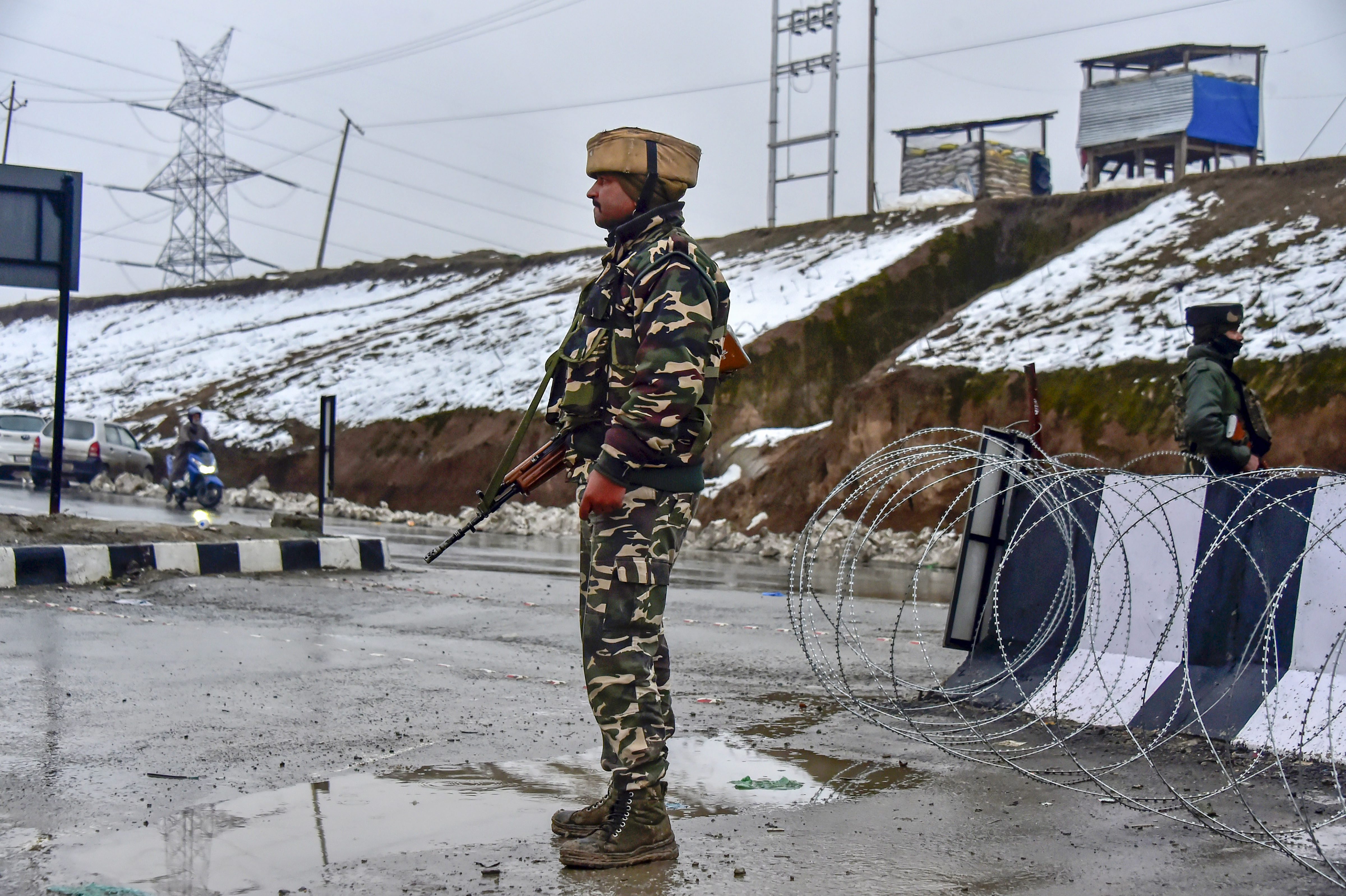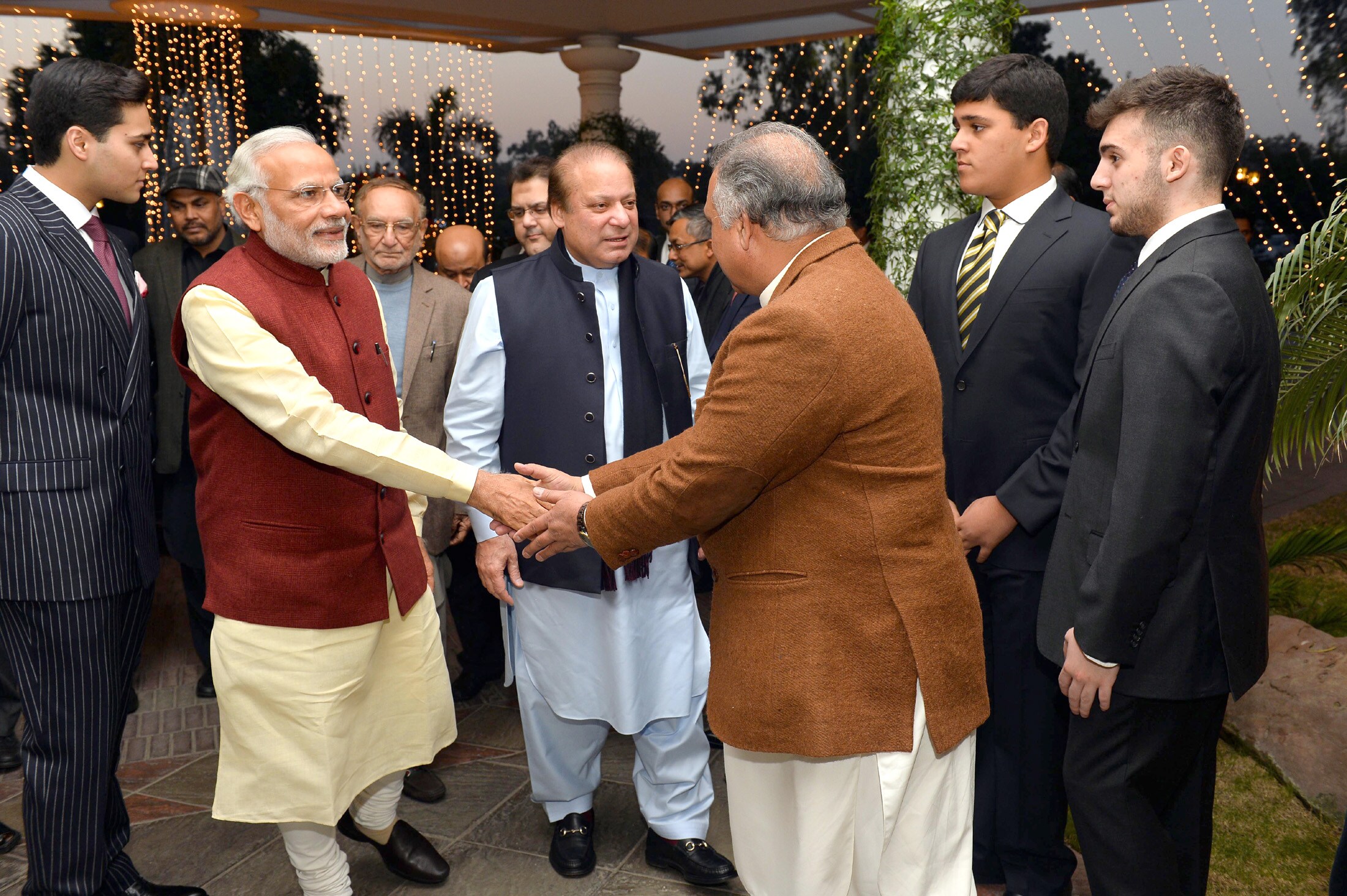
Irrespective of whether or not Prime Minister Narendra Modi is able to convince voters at the coming hustings to give him a second term in office, his first five years in power at the head of a majority government will be remembered for one of the biggest policy failures: to evolve a strategy to deal with Pakistan and neutralise its murderous cross-border terror apparatus.
This stark truth was brought home, though not for the first time, on Thursday when at least 37 Central Reserve Police Force troopers were killed after a suicide bomber rammed his explosives-packed vehicle into a bus that formed part of a convoy carrying security forces from Jammu to Srinagar. The terrorist attack happened at Awantipora in Pulwama district on the main highway that connects Jammu and Srinagar.
The exact minute of the attack — the nature and amount of explosives that were used; how the suicide bomber made his way to the heavily guarded convoy; and, whether there was actually a massive intelligence lapse as is being talked about — will be the subject of forensic and other investigations. They need not detain us at the moment.
What is important to note is that the Pakistan-based Deobandi jihadist organisation Jaish-e-Mohammed has claimed responsibility for the attack. Led by Masood Azhar, the JeM has been active in the Kashmir Valley for some time and has upped the ante in recent days. Though officially banned in Pakistan, the JeM enjoys ISI-sponsored privileges and is believed to be Rawalpindi's current favourite instrument of cross-border terror.
Repeated attempts by India to get the UN Security Council to impose sanctions on Masood Azhar and declare him a designated terrorist under the 1267 Sanctions Committee have been frustrated by an obstinate China. Thursday's carnage should be seen as the JeM thumbing its nose at the Indian state.
Pakistan has issued a wishy-washy statement that predictably denies any role as has been charged by India. Equally predictably, China has maintained an inscrutable face.
A second point that is of import is that the suicide bomber, Adil Ahmad Dar, was a local Kashmiri who, as per a video released by JeM after the attack, joined the terrorist organisation last year. His indoctrination and radicalisation was complete to the point that he believed he would be in heaven by the time people saw his pre-recorded message of ‘martyrdom' for Islam.
A last point indicates possible intelligence failure at multiple levels. Early assessment by explosives experts suggests that anything between 200 kg and 300 kg of explosives were packed into the vehicle driven by the suicide bomber. Some reports specifically mention that it had been packed with 350 kg of explosives. The exact figure is inconsequential beyond academic interest.
What is of concern is that such a huge amount of explosives made its way undetected to Kashmir, apart from two other interlinked facts.

First, a certain amount of critical training in handling explosives and putting together an IED of the nature that was used has been imparted to separatists who remain anonymous and at large. Second, Thursday's bombing potentially marks a tectonic shift in the jihadists' tactics: Suicide bombings and car bombs could become the preferred choice of terror's puppet masters in Pakistan.
The vacuous response of politicians representing the BJP and its allies, as also the hackneyed statement of the Prime Minister himself, bear testimony to their being caught by surprise, totally unaware of this tactical shift and the seeming ease with which the JeM and its handlers in the ISI now operate in Jammu & Kashmir. Had there been a policy-driven strategy then the response would have been a swift but measured tactical move, not statements that mean nothing.
That the Cabinet Committee on Security could not meet immediately after the attack or later in the evening or even late at night tells its own story: There was dearth of information beyond the screeching coverage of news TV and the chatter on social media. When the CCS met on Friday morning, it came up with yet another knee-jerk reaction by the Establishment. The decision to withdraw ‘Most Favoured Nation' status to Pakistan will at best have minimalist repercussion on bilateral trade, such as it is between the two countries. The Prime Minister's dire warning to the perpetrators of the horrific crime can be interpreted any which way you want.
The fact remains that since Jammu & Kashmir is now under central rule for all practical purposes, the responsibility of holding the line and pushing back Pakistan-backed disruptive forces devolves entirely upon the Union Government.
Prime Minister Modi and his team cannot claim otherwise. The rapidly increasing belligerence of the jihadists who have begun executing citizens with impunity after accusing them of being police informers was indicative of an imminent big attack to bolster the separatist movement. In hindsight perhaps it was not a good idea to make a jubilant show of security forces cleansing Baramulla district of terrorists. Thursday's chilling message is that for every Baramulla there is a Pulwama.
Data released as recently as February 5 by the Ministry of Home Affairs shows a steady decline in the security scenario in Jammu & Kashmir since 2014, including the period when the BJP was in power with the PDP. The government could present these statistics to show more terrorists were neutralised in these five years but that would not detract from the rising fatality figures for security forces. Where was the scope for not anticipating a massive attack?
The ungainly truth is that political propaganda has got the better of a missing national security strategy and a Pakistan policy that exists in absentia.
In the clamour to demonstrate that India has been free of major terrorist attacks after Pathankot and Uri, too much political capital has been expended on creating a false narrative instead of forging a no-surprise strategy in dealing with Pakistan.
Making a fetish of the 2016 surgical strike and turning a theatrical line from a movie script, “How's the josh?” into a popular slogan resulted in expected ennui as the grim details of the Pulwama attack seeped through social media platforms. “How's the hosh?” summed up the seething anger.
Briefing the media after the CCS meeting Finance Minister Arun Jaitley said “a detailed assessment of the incident was taken. Several elements were discussed which are not to be disclosed.” So what are the options for India now? Registering a protest with the UN is a meaningless exercise. Another surgical strike or multiple incursions across the LoC and the border would make for countervailing headlines but are fraught with danger. Prime Minister Modi could turn off the Indus Water Treaty tap but that would invite consequences of a different nature. A dramatic show of India responding to the challenge by bombing terror camps and facilities in Pakistan-occupied Kashmir could yield spectacular electoral dividends provided it does not invite retaliatory action and a rapid escalation. That would be politically inadvisable weeks before India goes to the polls. More important, both Washington, DC and Beijing would take a dim view if this were to happen. Or, as always, the government could indulge in some headline-grabbing sabre-rattling, get India's neighbours to denounce Pakistan's terror-sponsoring ways and pretend that it has won this round. “International isolation" is the new buzzword though an isolated Pakistan has never quite suffered the intended punishment. Witness the ease with which it is able to refinance its broken economy.
Which brings us to the conclusion that whatever the government does at this point of time would be at best an episodic reaction with minimal results and at worst a non-response disguised in bombast of how India will respond at a time of its choosing. As a government loyalist noted while counselling patience, “Revenge is a dish best served cold.” That's as reassuring as terrorism being described as “cowardice” and “desperation”. It is not. Terrorism is cold-blooded mass murder meant to terrorise people.
Lost in the cacophony of public disquiet, opposition opprobrium and government's bluster is the undeniable realisation that like previous regimes, the NDA too has failed to forge a stable policy within a strategic framework to deal with Pakistan and its strategy of ‘inflicting a thousand cuts'. There are no predetermined, graded, ready to implement tactical responses to Pakistan's perfidy. There are only placebo statements meant to address anger at home rather than villainy across the border.
After promising a tough stand that would be a far cry from the Sharm el-Sheikh capitulation by his predecessor, Prime Minister Modi has little to show other than his misplaced effort to befriend an implacable foe. The sheer amateurishness of the choreographed ‘unplanned' visit to Pakistan and dropping in at Nawaz Sharif's home to break bread with him will remain the legacy of a nationalist government that strangely forgot that it had promised to uphold the national interest and not indulge in PR capers with zero returns for India and its people.

">
Between inaction and war lies a big zone of coercive action to bring rogue countries to heel. To be fair, nobody expected Prime Minister Modi to bomb Pakistan back to the stone age, as was threatened by the US after 9/11. But he was expected to devise coercive means by way of smart tactics to hit Pakistan where it hurts the most. For a while it seemed this would happen when he signalled support for the Baloch freedom movement. Sadly he backtracked the moment that threat seemed to work and Baloch leaders came knocking at his door to redeem his promise.
It has been wisely said that powerful nations have the capacity to absorb punishment as well as the capacity to mercilessly inflict punishment. It is for the government to decide whether India is a powerful nation willing to stand alone if needed or a limp-wristed weakling given to whining and protesting at being bullied by a failed and beggared jihadist state. Tragically, this government, like others in the past barring the government led by Mrs. Indira Gandhi in 1971, seems to have decided to be on the wrong side of popular expectation.
This article was originally published on Observer Research Foundation, and has been republished with permission.
Kanchan Gupta is Distinguished Fellow at Observer Research Foundation.
The views expressed here are those of the author and do not necessarily represent the views of Bloomberg Quint or its editorial team.
Former Indian High Commissioner Sharat Sabharwal And Manoj Joshi, former Distinguished Fellow At ORF On India's Options After The Pulwama Attack.
Essential Business Intelligence, Continuous LIVE TV, Sharp Market Insights, Practical Personal Finance Advice and Latest Stories — On NDTV Profit.























